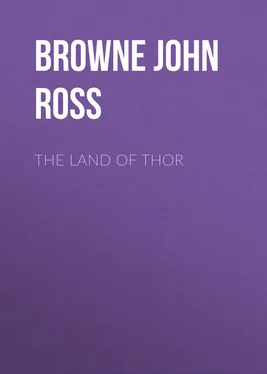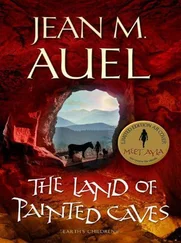John Browne - The Land of Thor
Здесь есть возможность читать онлайн «John Browne - The Land of Thor» — ознакомительный отрывок электронной книги совершенно бесплатно, а после прочтения отрывка купить полную версию. В некоторых случаях можно слушать аудио, скачать через торрент в формате fb2 и присутствует краткое содержание. Жанр: foreign_antique, foreign_prose, Путешествия и география, на английском языке. Описание произведения, (предисловие) а так же отзывы посетителей доступны на портале библиотеки ЛибКат.
- Название:The Land of Thor
- Автор:
- Жанр:
- Год:неизвестен
- ISBN:нет данных
- Рейтинг книги:4 / 5. Голосов: 1
-
Избранное:Добавить в избранное
- Отзывы:
-
Ваша оценка:
- 80
- 1
- 2
- 3
- 4
- 5
The Land of Thor: краткое содержание, описание и аннотация
Предлагаем к чтению аннотацию, описание, краткое содержание или предисловие (зависит от того, что написал сам автор книги «The Land of Thor»). Если вы не нашли необходимую информацию о книге — напишите в комментариях, мы постараемся отыскать её.
The Land of Thor — читать онлайн ознакомительный отрывок
Ниже представлен текст книги, разбитый по страницам. Система сохранения места последней прочитанной страницы, позволяет с удобством читать онлайн бесплатно книгу «The Land of Thor», без необходимости каждый раз заново искать на чём Вы остановились. Поставьте закладку, и сможете в любой момент перейти на страницу, на которой закончили чтение.
Интервал:
Закладка:
It is sometimes rather amusing to compare one’s preconceived ideas of a place with the reality. A city like Moscow is very difficult to recognize from any written description. From some cause wholly inexplicable, I had pictured to my mind a vast gathering of tall, massive houses, elaborately ornamented; long lines of narrow and gloomy streets; many great palaces, dingy with age; and a population composed chiefly of Russian nabobs and their retinues of serfs. The reality is almost exactly the reverse of all these preconceived ideas. The houses for the most part are low – not over one or two stories high – painted with gay and fanciful colors, chiefly yellow, red, or blue; the roofs of tin or zinc, and nearly all of a bright green, giving them a very lively effect in the sun; nothing grand or imposing about them in detail, and but little pretension to architectural beauty. Very nearly such houses may be seen every day on any of the four continents.
Still, every indication of life presents a very different aspect from any thing in our own country. The people have a slow, slouching, shabby appearance; and the traveler is forcibly reminded, by the strange costumes he meets at every turn – the thriftless and degenerate aspect of the laboring classes – the great lumbering wagons that roll over the stone-paved streets – the droskies rattling hither and thither with their grave, priest-like drivers and wild horses – the squads of filthy soldiers lounging idly at every corner – the markets and market-places, and all that gives interest to the scene, that he is in a foreign land – a wild land of fierce battles between the elements, and fiercer still between men – where civilization is ever struggling between Oriental barbarism and European profligacy.
The most interesting feature in the population of Moscow is their constant and extraordinary displays of religious enthusiasm. This seems to be confined to no class or sect, but is the prevailing characteristic. No less than three hundred churches are embraced within the limits of the city. Some writers estimate the number as high as five hundred; nor does the discrepancy show so much a want of accuracy as the difficulty of determining precisely what constitutes a distinct church. Many of these remarkable edifices are built in clusters, with a variety of domes and cupolas, with different names, and contain distinct places of worship – as in the Cathedral of St. Basil, for instance, which is distinguished by a vast number of variegated domes, and embraces within its limits at least five or six separate churches, each church being still farther subdivided into various chapels. Of the extraordinary architectural style of these edifices, their many-shaped and highly-colored domes, representing all the lines of the rainbow, the gilding so lavishly bestowed upon them, their wonderfully picturesque effect from every point of view, it would be impossible to convey any adequate idea without entering into a more elaborate description than I can at present attempt.
But it is not only in the numberless churches scattered throughout the city that the devotional spirit of the inhabitants is manifested. Moscow is the Mecca of Russia, where all are devotees. The external forms of religion are every where apparent – in the palaces, the barracks, the institutions of learning, the traktirs, the bath-houses – even in the drinking cellars and gambling-hells. Scarcely a bridge or corner of a street is without its shrine, its pictured saint and burning taper, before which every by-passer of high or low degree bows down and worships. It may be said with truth that one is never out of sight of devotees baring their heads and prostrating themselves before these sacred images. All distinctions of rank seem lost in this universal passion for prayer. The nobleman, in his gilded carriage with liveried servants, stops and pays the tribute of an uncovered head to some saintly image by the bridge or the roadside; the peasant, in his shaggy sheepskin capote, doffs his greasy cap, and, while devoutly crossing himself, utters a prayer; the soldier, grim and warlike, marches up in his rattling armor, grounds his musket, and forgets for the time his mission of blood; the tradesman, with his leather apron and labor-worn hands, lays down his tools and does homage to the shrine; the drosky-driver, noted for his petty villainies, checks his horse, and, standing up in his drosky, bows low and crosses himself before he crosses the street or the bridge; even my guide, the saturnine Dominico – and every body knows what guides are all over the world – halted at every corner, regardless of time, and uttered an elaborate form of adjurations for our mutual salvation.
Pictures of a devotional character are offered for sale in almost every booth, alley, and passage-way, where the most extraordinary daubs may be seen pinned up to the walls. Saints and dragons, fiery-nosed monsters, and snakes, and horrid creeping things, gilded and decorated in the most gaudy style, attract idle crowds from morning till night.
It is marvelous with what profound reverence the Russians will gaze at these extraordinary specimens of art. Often you see a hardened-looking ruffian – his face covered with beard and filth; his great, brawny form resembling that of a prize-fighter; his costume a ragged blouse, with loose trowsers thrust in his boots; such a wretch, in short, as you would select for an unmitigated ruffian if you were in want of a model for that character – take off his cap, and, with superstitious awe and an expression of profound humility, bow down before some picture of a dragon with seven heads or a chubby little baby of saintly parentage.
That these poor people are sincere in their devotion there can be no doubt. Their sincerity, indeed, is attested by the strongest proofs of self-sacrifice. A Russian will not hesitate to lie, rob, murder, or suffer starvation for the preservation of his religion. Bigoted though he may be, he is true to his faith and devoted to his forms of worship, whatever may be his short-comings in other respects. It is a part of his nature; it permeates his entire being. Hence no city in the world, perhaps – Jerusalem not excepted – presents so strange a spectacle of religious enthusiasm, genuine and universal, mingled with moral turpitude; monkish asceticism and utter abandonment to vice; self-sacrifice and loose indulgence. It may be said that this is not true religion – not even what these people profess. Perhaps not; but it is what they are accustomed to from infancy, and it certainly develops some of their best traits of character – charity to each other, earnestness, constancy, and self-sacrifice.
On the morning after my arrival in Moscow I witnessed from the window of my hotel a very impressive and melancholy spectacle – the departure of a gang of prisoners for Siberia. The number amounted to some two or three hundred. Every year similar trains are dispatched, yet the parting scene always attracts a sympathizing crowd. These poor creatures were chained in pairs, and guarded by a strong detachment of soldiers. Their appearance, as they stood in the street awaiting the order to march, was very sad. Most of them were miserably clad, and some scarcely clad at all. A degraded, forlorn set they were – filthy and ragged – their downcast features expressive of an utter absence of hope. Few of them seemed to have any friends or relatives in the crowd of by-standers; but in two or three instances I noticed some very touching scenes of separation – where wives came to bid good-by to their husbands, and children to their fathers. Nearly every body gave them something to help them on their way – a few kopecks, a loaf of bread, or some cast-off article of clothing. I saw a little child timidly approach the gang, and, dropping a small coin into the hand of one poor wretch, run back again into the crowd, weeping bitterly. These prisoners are condemned to exile for three, four, or five years – often for life. It requires from twelve to eighteen months of weary travel, all the way on foot, through barren wastes and inhospitable deserts, to enable them to reach their desolate place of exile. Many of them fall sick on the way from fatigue and privation – many die. Few ever live to return. In some instances the whole term of exile is served out on the journey to and from Siberia. On their arrival they are compelled to labor in the government mines or on the public works. Occasionally the most skillful and industrious are rewarded by appointments to positions of honor and trust, and become in the course of time leading men.
Читать дальшеИнтервал:
Закладка:
Похожие книги на «The Land of Thor»
Представляем Вашему вниманию похожие книги на «The Land of Thor» списком для выбора. Мы отобрали схожую по названию и смыслу литературу в надежде предоставить читателям больше вариантов отыскать новые, интересные, ещё непрочитанные произведения.
Обсуждение, отзывы о книге «The Land of Thor» и просто собственные мнения читателей. Оставьте ваши комментарии, напишите, что Вы думаете о произведении, его смысле или главных героях. Укажите что конкретно понравилось, а что нет, и почему Вы так считаете.











